Classic Commentaries and Studies on Leviticus (21 vols.)
Digital Logos Edition
Overview
This massive twenty-one volume collection features some of the best commentaries and studies on the book of Leviticus from the late nineteenth and early twentieth centuries. With scholars such as S. R. Driver, M. M. Kalisch, James G. Murphy, and William Kelly, Classic Commentaries and Studies on Leviticus (21 vols.) offers over 4,000 pages of interpretation, observations, translations, contextual history, and application of law. The twenty-one volumes contained in Classic Commentaries and Studies on Leviticus (21 vols.) have had an enduring impact on Old Testament exegesis, and this exceptional collection provides easy accessibility to this wealth of significant scholarship.
This collection is essential for students, scholars, pastors, historians, teachers of the Bible, or anyone studying the book of Leviticus. With Logos Bible Software, this collection is completely searchable, with passages of Scripture appearing on mouse-over, as well as being linked to the Greek and Hebrew texts and English translations in your library. This makes these texts more powerful and easier to access than ever before for scholarly work or personal Bible study. With the advanced search features of Logos Bible Software, you can perform powerful searches by topic or Scripture reference—finding, for example, every mention of “Sacrifice” or "Leviticus 16:1.”
This title is included in the following collections
You can save when you purchase this product as part of a collection.
Classic Commentaries and Studi...
$499.37$159.99Logos 8 Collector's Edition Le...
$11,399.99$11,399.99Logos 9 Collector's Edition Le...
$11,399.99$11,399.99Logos 8 Ultimate Legacy Librar...
$21,749.99$21,749.99
- $24,999.99

- Over four-thousand pages of notable scholarship on Leviticus
- Noted authors from a variety of backgrounds
- Completely searchable, linked to your preferred Bible translation and the other books in your library
- Title: Classic Commentaries and Studies on Leviticus
- Volumes: 21
- Pages: 4849
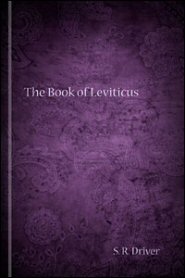
Translated by S. R. Driver and H. A. White, this English translation of Leviticus takes into account both Hebrew and Arabic manuscripts of the original text. Driver and White include extensive notes and explanation for elucidation of the original meaning.
Scholars will find this edition a treasure indeed.
—The London Quarterly Review
Paul Haupt (1858–1926) was educated at the University of Berlin and the University of Leipzig before becoming an Associate Professor at the University of Göttingen. Haupt discovered the Sumerian language in 1880 before publishing multiple works on Sumerian culture, Akkadian culture, Nimrod, and Ecclesiastes.
Samuel Rolles Driver (1846–1914) was educated at Winchester School and Oxford University, where he later became a fellow of New College in 1870. He was awarded the Pusey and Ellerton scholarship in 1866, the Kennicott scholarship in 1870 (both Hebrew), and the Houghton Syriac prize in 1872. In 1883 he succeeded E. B. Pusey in the Regius Chair of Hebrew at Oxford, which he occupied for the rest of his life.
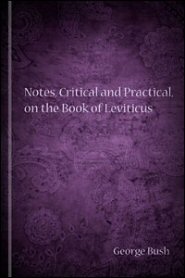
Following the scope of regulation and law in Leviticus, Bush provides concise annotation, exegesis, and practical exposition of the original Hebrew. Bush compares Leviticus with alternative Old Testament books to show variable meaning in grammar and semantic thought.
This volume strikes us, on a cursory perusal, as equal to any of its predecessors, in learning, ingenuity and force of style, while it is certainly superior to some of them in conciseness of style and soundness of judgment.
—The Bible Repertory and Princeton Review
George Bush (1796–1859) was educated at Dartmouth and Princeton before being ordained in the Presbyterian Church. Bush later went on to become Professor of Hebrew and Oriental Literature at New York University.
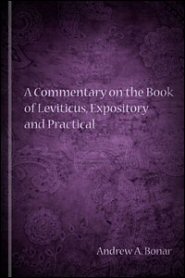
Discoursing on "the clearest book of Jewish Gospel," Andrew A. Bonar engages the reader with the significance of ceremonial atonement and grace. Bonar provides detailed analysis of symbolic connections: such as the resemblance of certain rites to communion.
Mr. Bonar's commentary on Leviticus is full of devout thought, and discovers a high appreciation of the distinguishing peculiarities of the Gospel.
—The Churchman's Monthly Review
He expounds each verse in course, and presents practical considerations of great importance. We commend the volume to clergymen and families as exceedingly valuable. Bonar employs similitudes and allegories to expound on the principles held in Leviticus.
—The Baptist Memorial and Monthly Record
Andrew A. Bonar (1810–1892) was educated at the University of Edinburgh and was ordained into the Church of Scotland. Bonar published many works including Christ and His Church in the Book of Psalms, Memoir and Remains of Rev. Robert Murray McCheyne, and Commentary on Leviticus.
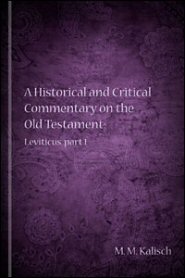
Engaging in objective, critical, and philosophical analysis, M. M. Kalisch provides ample exegesis on the book of Leviticus and the system of laws given to the Israelites. Kalisch explores the symbolism of blood sacrifice and its relationship to redemption in Christianity.
For ourselves, we can say that no writer of recent times has impressed us with a deeper respect for his learning, thoroughness, diligence, and breadth of view; for every quality desirable in an expositor of the Old Testament—"save these bonds."
—The London Quarterly Review
M. M. Kalisch (1828–1885) studied classics, philology, and Semitic languages at Berlin University and the Rabbinical College of Berlin. His numerous works include A Hebrew Grammar with Exercises, A Historical and Critical Commentary on the Old Testament: Exodus, as well as commentaries on Genesis and Leviticus.
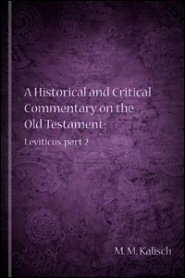
Picking up where volume one left off, volume two introduces explanatory notes, critical analysis, and collaborative treatises on dietary law, purification, and atonement under the law. Kalisch respectively explores the inherent purpose of the law, and its implications on atonement.
Dr. Kalisch is an eminent Hebrew scholar, and has done much to further the study of the Old Testament in this country.
—The London Quarterly Review
M. M. Kalisch (1828–1885) studied classics, philology, and Semitic languages at Berlin University and the Rabbinical College of Berlin. His numerous works include A Hebrew Grammar with Exercises, A Historical and Critical Commentary on the Old Testament: Exodus, as well as commentaries on Genesis and Leviticus.
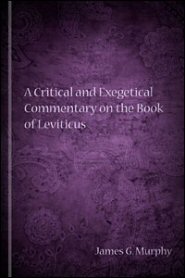
Focusing on the doctrines of redemption, expiation, and sanctification, James G. Murphy offers comprehensive studies on the Book of Leviticus. Murphy embraces the nature and purpose of each sacrifical rite, and expounds on the reverance and submission to divine justice. He takes into account the fundamental principles of salvation, and provides a comparison between salvation under the law and salvation through Christ.
He is successful in explaining the Book of Leviticus as ‘the figurative exhibition of the way of salvation;’ as giving ‘a series of symbolic forms suited to the primeval stage of the human race, and fitted to edify the infant people of God.’
—Bibliotheca Sacra
Difficulties are met face to face, and no useless parade of grammatical lore cumbers the pages of this truly learned and evangelical commentary.
—Christian Intelligence
James G. Murphy was an author and a professor of Hebrew and Old Testament at Assembly’s College, Belfast.
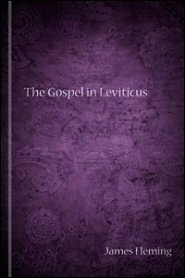
In this volume on Leviticus, James Fleming uses collaborative comparison with the Prophets and New Testament to provide an analysis of the consistent channels of atonement, redemption, ethics, and morality from the Godhead. Fleming expresses the importance of the High Priest as the intercessor to God—a role that is now fulfilled by Christ.
We heartily commend the book, and would rejoice to be assured that its teachings were heard from every pulpit throughout the land.
—The United Presbyterian Magazine
James Fleming was Congregational Minister in Lancaster. Fleming authored Christian Sunsets and Early Christian Witnesses and died in 1879.
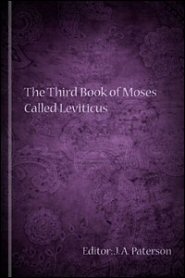
Following the historical development of sacrificial atonement and the role of the High Priest as an intercessory, J. A. Paterson provides concise studies on the extent of the law found in Leviticus. Paterson expresses the roles and social obligations of the Levites within the Israelite nation, as well as the unique role of Aaron as High Priest.
The work promises to be an important step in the progress of education and will probably appeal to a wide circle of readers and devotees of literature.
—Book News
J. A. Paterson was Professor of Hebrew and Old Testament Exegesis at New College in Edinburgh, Scotland.
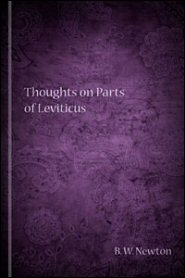
In Thoughts on Parts of Leviticus, B. W. Newton directs his attention to the character traits and attitudes required by Leviticus, namely: devotion, acknowledgement of sin, and the need for grace and redemption. By examining the inherent purposes of the law, Newton connects the law with the ultimate sacrifice.
B. W. Newton (1807–1899) was educated at Exeter College, Oxford. Newton was noted for his rejection of the Anglican Church and becoming a non-conformist.
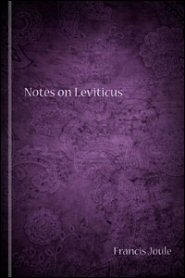
Published after the death of Francis Joule, Notes on Leviticus moves expositionally chapter-by-chapter through the book of Leviticus. Joule offers critical interpretation of the laws given after the exodus from Egypt, with ample regard to the symbolism of blood sacrifice.
G. H. Pember was educated at Hereford Cathedral School and Cambridge. Pember was noted for his works in theology and animal welfare.
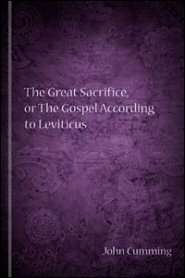
Using comparison with the Gospels, John Cumming introduces salvation and vindication by grace—through inherent faith in the sacrifice. Cumming expresses that as Christians while we receive grace through faith in the sacrifice of Christ, the Israelites' faith in blood sacrifice led to similar vindication.
This volume contains much good and solid matter, and has evidently cost the author more earnest and serious thought than some of his productions, to which we could refer, at more than twice its bulk.
—Tait's Edinburgh Magazine
John Cumming was educated at King's College and the University of Aberdeen before being ordained into the Anglican Church. Cumming went on to become Regius Professor of Divinity and Ecclesiastical History at the University of Edinburgh.
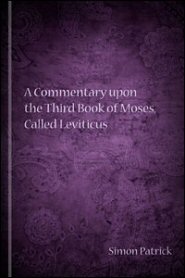
Drawing upon Greek and Latin classics for comparison, Simon Patrick explores the rituals and obligations of sacrificial redemption found in Leviticus. Providing contextual commentary, semantics, and extensive annotation, the author offers extensive interpretation and studies of the text.
Simon Patrick was educated at Boston Grammar School and Queens College, Cambridge. He later became Vicar of Battersea, Surrey and Bishop of Chichester, Canterbury.
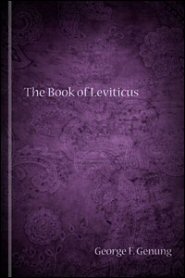
In The Book of Leviticus George F. Genung presents succinct commentary on the origins, interpretation, intention, and acceptance of Leviticus. Discussing literary methodology, transposition from oral tradition, compilation, and jurisprudence, Genung formulates critical interpretation from historical and semantic implications.
George F. Genung was educated at Union College before becoming Dean of Richmond Theological Seminary.
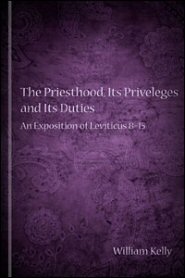
Expounding on the purpose of the priesthood and the separation under the law, William Kelly provides concise studies on the canon of Leviticus. Kelly exegetically inquires into the capacity of Israel to maintain a wholesome relationship with Yahweh under the law.
William Kelly was an Irish scholar born in 1821. He was a prominent member of the Plymouth Brethren, a conservative evangelical school of thought. Specializing in textual criticism, Kelly published several works on various books of the Bible. He died in 1906.
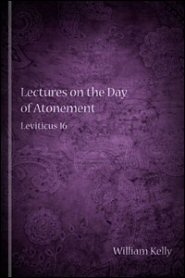
Arranged as a series of five lectures, William Kelly succinctly focuses on the Day of Atonement, Yom Kippur. Kelly characterizes the day of atonement as a renewal of righteousness through grace and love—providing provisional, not enduring atonement.
William Kelly was an Irish scholar born in 1821. He was a prominent member of the Plymouth Brethren, a conservative evangelical school of thought. Specializing in textual criticism, Kelly published several works on various books of the Bible. He died in 1906.
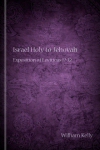
Focusing solely on chapters seventeen to twenty-two of Leviticus, William Kelly provides critical interpretation and exposition with practical application of distinct themes. Kelly asserts that human life is forfeited upon sinning, and that divine redemption is the only way to keep us from that path.
William Kelly was an Irish scholar born in 1821. He was a prominent member of the Plymouth Brethren, a conservative evangelical school of thought. Specializing in textual criticism, Kelly published several works on various books of the Bible. He died in 1906.
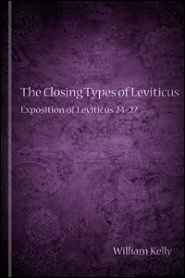
Imparting Israel's responsibilities in maintaining the covenant relationship with Jehovah, Kelly exegetically examines the regulations and principles that the Levites were responsible for carrying out. He outlines the spiritual symbolism encountered in each regulation, as well as the connection to atonement and redemption.
William Kelly was an Irish scholar born in 1821. He was a prominent member of the Plymouth Brethren, a conservative evangelical school of thought. Specializing in textual criticism, Kelly published several works on various books of the Bible. He died in 1906.
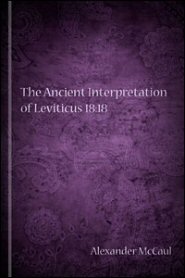
Directing his attention to Leviticus 18:18, Alexander McCaul provides a concise exposition on the ethics of marriage. Interpreting semantics from both the Masoretic texts and Septuagint, McCaul discusses the moral and relational obligations within the Jewish and Hellenistic cultures.
Alexander McCaul, born in 1836, was Professor of Hebrew and Old Testament Exegesis at Kings College, London. McCaul was appointed as Rector of St. Magnus, St. Margaret, and St. Michael.
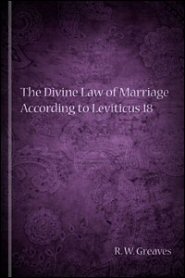
Focusing on the topics of marriage and sexuality found in Leviticus 18, R. W. Greaves presents a terse exegetical commentary that explores the prohibitions given by Moses.
R. W. Greaves, born in 1820, was Rector of Tooting from 1836 until 1853. Greaves received his Bachelors at age 16.
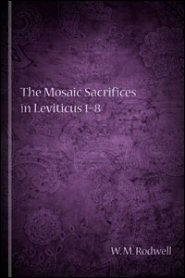
Connecting sacrificial atonement in Leviticus with the sacrifice of Christ, W. M. Rodwell offers critical studies that express the importance of redemptive sacrifice. Drawing upon the Masoretic text, the Septuagint, the Vulgate, the Syriac Version, and Targums, Rodwell covers semantics, symbolism, conventional meaning, and faith of individuals.
W. M. Rodwell was educated at Didsbury College before becoming Chairman of Kent District.
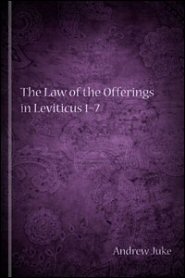
Examining the inherent purpose of the law, and the restitution required upon trespassing against it, Andrew Juke critically examines the text while providing exposition on sacrificial offering. Juke provides practical elucidation of the need for grace under the Law.
Andrew Juke was educated at Blundell's School before traveling to the UK to work on his M.D. Juke is notable for his translation of the Bible into Siraiki.
Reviews
2 ratings

Larry Proffitt (I
11/13/2013
Eduardo Vega
9/25/2013